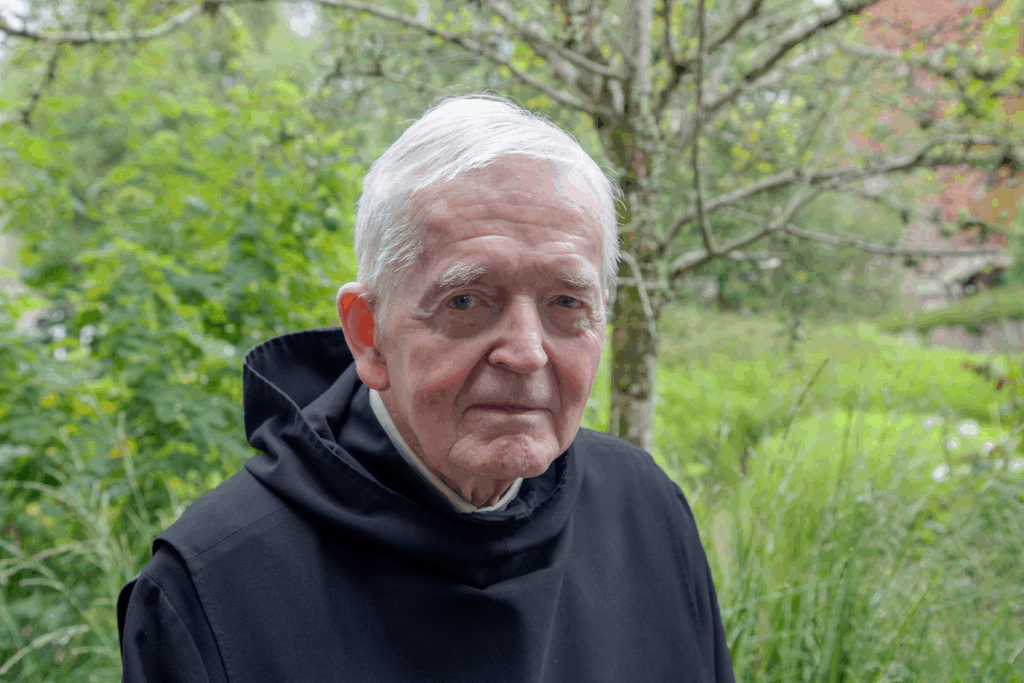
Roimh Lá Eorpach na dTeangacha, déanann an Bráthair Cillian Ó Sé OSB machnamh ar a thuras ó leanbh aonteangach go fear ilteangach…
Rugadh mise ar an 1940 i gCathair Chorcaí. Tógadh mé sa chathair freisin go dtí go raibh mé 20 bhliain d’aois. D’fhreastal mé ar an mbunscoil ba chomhgaraí do theach mo mhuintire. Bhí na ranganna go léir trí Ghaeilge, seachas na ranganna i mBéarla agus Teagasc Críostaí. Ní raibh aon Ghaeilge ag mo thuismitheoirí; dá bhrí sin, ní raibh ar a gcumas aon chabhair a thabhairt dom le m’obair bhaile! Dalta ciúin a bhí ionam; le an-dhúil agam i léitheoireacht. Nuair a fhág mé an bhunscoil, bhí Gaeilge cuíosach maith agam, ach ní raibh aon tseans agam í a chleactadh taobh amuigh den seomra ranga. Freisin, bhí an Béarla mar ghnáth-theanga chumarsáide sa mheánscoil nua, cé go raibh an t-ádh liom go raibh múinteoir maith agam i gcóir na Gaeilge – fuair mé toradh maith san scrúdú Ardteistiméireachta san ábhar sin. An t-aon teanga iasachta a múineadh sa scoil ná an Laidean. Fuair mé amach gur chabhraigh graiméar na Laidne go mör liom structúr na Gaeilge agus nua-theangacha eile a thuiscint. Freisin, nuair a bhí mé sa Chúigiú Bhliain, fuair mé ranganna príobháideacha sa bhFraincis.
Timpeall an ama sin, chuaigh mé isteach sa Bhuíon Ghaelach, buíon choisithe san bhFórsa Chosanta Áitiúil (FCÁ) ina raibh an traenáil iomlán as Ghaeilge, mar a bhí an gnáth-chumarsáid idir na saighdiúiri. Bhíodh na campaí samhraidh go léir againn sa Ghaeltacht, mar shampla i gCúil Aodha nó sa Mhuiríoch. B’shin í mo chéad seans seal a chaitheamh i dtimpeallacht lán-Ghaeilge.
Agus an Ardteistiméireacht faighte agam, chuaigh mé ar Choláiste na hOllscoile Corcaigh (UCC) agus fuair mé céim i nEalaíona (BA) le Laidean agus Stair mar phríomhábhair. Ansin fuair mé an an tArd – Teastas i nOideachas mar cháilíocht iarchéime a thug ceart dom múineadh ar mheánscoil. Le linn an an ama sinn go léir bhí mé ag freastal ar ranganna seachtiniúla i nGearmáinis, agus shocraigh mé freastal ar dhianchúrsa sa teanga sin sa Ghearmáin féin a bhí eagraithe ag an Goethe-Institut, institiúd cultúrtha Rialtas na hIar-Ghearmáine. Ag deireadh an chúrsa sin, a mhair 10 seachtain, bhí buntús na teangan im ghreim agam.
Bhí an seal a bhí caite agam san FCA tar éis mo shuim sa saol mileata a neartú, agus i 1963 chiuir mé iarratas isteach ar choimisiún gearr-théarmach i nArm na Breataine. Níor chreid mé i bpolasaí na neodrachta a bhí ag Éirinn, agus shocraigh mé dá bhrí sin mo sheirbhís a dhéanamh i stát a bhí ina bhall de NATO. Chaith mé trí bliana mar leifteanant san RAEC (Royal Army Education Corps) ag múineadh ábhar éagsúla do shaighdiúirí óga i nAlbain. Le linn an ama sin rinne mé dhá mhalartú le hArm na hIar-Ghearmáine (i Hamburg agus Wolfenbuettel) agus ceann amháin le hArm na Fraince (i Le Mans); freisin, bhain mé amach cáilíocht mar Teangaire Mileata sa Ghearmáinis ó Stát-Sheirbhís na Breataine.
Nuair a fhill mé ar Éirinn tar éis mo sheirbhíse mileata, fuair mé cead speisialta ó UCC an scrúdú BA a dhéanamh i nGearmáinis. Fuair mé onóracha den gcéad grád, agus shocraigh mé céim MA a dhéanamh san ábhar céanna i nOllscoil Briostó. Ina dhiaidh sin, fuair mé seans scoilbhliain a chaitheamh san Iorua ag múineadh Béarla agus Gearmáinise i n-iarbhunscoil i ndeisceart na tíre. Theastaigh uaim teanga eile Theotanach a fhoghlaim. Ní raibh focal amháin Ioruaise agam nuair a thosaigh an scoilbhliain. Rinne mé dianchúrsa sa teanga, mar bhí fonn orm a fháil amach an mbeadh ar mo chumas teanga nua a fhoghlaim tré thomadh iomlán a dhéanamh innti gach lá, ag léamh nuachtáin, ag éisteacht leis an raidio, ag caint le muinteoirí agus daltaí, etc. Toisc nach labhairtear an Ioruais go forleathan taobh amuigh den Iorua, bíonn Béarla ar a thoil ag beagnách gach Ioruach, ach d’iarr mé ar mo leath-bhádóirí sa scoil gan Béarla a labhairt liom i gcruinnithe le linn ár ama saoir. Rinneadar amhlaidh, agus bhí áthas orthu gur theastaigh ó eachtrannach a dteanga dúchais a úsáid ina dtír féin. I ndeireadh na scoilbhliana bhí mé an-shásta go raibh ar mo chumas drámaí Ibsen a léamh sa bhunleagan.
Cúpla bliain ina dhiaidh sin, chothuigh an bhliain a chaith mé san Iorua suim ionam scoilbhliain a chaitheamh sa Ghearmáin chun snas a chur ar mo chumas sa teanga sin. Fuair mé post i scoil chónaithe i dtuaisceart na tíre ar an dteorainn leis an Ísiltír. Bhí lóistín agam ar champas na scoile, agus mé ag múineadh teangacha iasachta: Béarla, Fraincise agus Laidne. Thaitin an obair chomh mór sin liom gur fhan mé naoi mbliana (seachas bliain amháin!) ar an scoil sin, Chaitheadh mé laetheanta saoire gach bliain in Éirinn, agus diaidh ar ndiaidh d’aithin mé go raibh nósanna na Gearmáine ag dul i bhfeidhm chomh mór sin orm go raibh mé ag éirí “Germanior ipsis Germanis” , agus go raibh baol ann go ndéanfainn dearmad iomlán ar mo dhúchas Ghaelach. D’fhill mé ar mo thír dúchais i 1981 agus le 41 bliana thosaigh mé mo shaol mar mhanach. Thóg mé na móideanna solamanta i 1992, inar gheall mé fanúint im mhanach go dtí lá mo bháis. Mar adeir an seanfhocal: “Go bhfaighimís grásta Dé agus bás in Éirinn!” Amen!”
Cillian Ó Sé OSB



